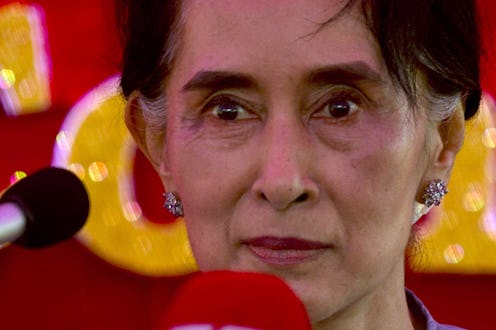News
Why You Should Know Aung San Suu Kyi
History in Myanmar was made on Friday when it was announced that the country's National League for Democracy opposition party had won enough seats in Parliament to be able to choose the next president. The victory in the nation's most credible election in 25 years marks a significant turn from isolated military rule to a more democratic system and a freer society open to international investors and tourists. But there is one integral person behind the party who much of this watershed moment should be attributed to. NLD founder Aung San Suu Kyi has brought democracy to Myanmar, but not after a long and tough battle that has made her a national icon.
On Friday, Myanmar's election committee announced that Suu Kyi's NLD party had won 348 seats in Parliament as a result of Sunday's election. This gives her party the majority rule and the power to choose the country's next president. Although Suu Kyi, who is widely regarded as the most popular politician in Myanmar, cannot become president herself, due to a provision in the country's Constitution, she will choose a proxy president when the new Parliament convenes in March.
Though the military will still have substantial power in government, Suu Kyi's party victory will mark the first end to Myanmar's military dictatorship since 1962. As the nation transitions into its new era of democracy, get to know all the reasons why you should know Aung San Suu Kyi, whose lifelong activism led to this historic day.
She Has Been A Long Proponent Of Democracy In Myanmar
In 1988, Suu Kyi founded the NLD party, which calls for a multi-party democracy in Myanmar, also known as Burma, through non-violent means. The party also advocates for human rights, particularly free speech, the rule of law, and increased social benefits.
She's A Fearless Leader
The daughter of Myanmar's independence hero, General Aung San, Suu Kyi was born to be a leader and freedom fighter. When she returned to Yangon, Myanmar in 1988, she witnessed her country in total upheaval against General Ne Win's dictatorial government. Like father, like daughter, she spearheaded a revolution against General Ne Win and became a key player in the 8888 Uprising.
She's Always Been Loved By The People Of Myanmar
In the 1990 election, Suu Kyi's NLD won 59 percent of the vote, which would have given them 80 percent of the seats in Parliament. However, the military junta refused to give her power and instead nullified the election results. Over the years, she's become affectionately known as "The Lady" to the Burmese people.
She's A Firm Believer And Practitioner Of Non-Violence
Suu Kyi is heavily influenced by Mahatma Gandhi's philosophy of non-violence, Dr. Martin Luther King, Jr.'s civil rights movement, and Buddhist teachings, all of which have helped shape her own non-violent movement toward democratic reform.
She Was Placed Under House Arrest For Her Beliefs
Suu Kyi's NLD and demonstrations were met with opposition from the army, and she was placed under house arrest in 1989. She would go on to live 15 of the previous 21 years under house arrest. When the government offered her freedom in exchange for leaving the country, she refused, vowing to keep fighting until the military junta released government control to the people.
She Survived An Attack
In 1996, during a brief period when she was not under house arrest, Suu Kyi was riding in a motorcade with two other NLD leaders when roughly 200 men ambushed them and started beating on the cars with chains, metal batons, and other weapons. The attackers were allegedly members of the military junta's Union Solidarity and Development Association. The NLD filed a police report, but no official action was taken.
She Won The Nobel Peace Prize And Many Other Accolades
In 1991, Suu Kyi received the Nobel Prize for Peace for her political activism. The Nobel Prize committee chairman called her "an outstanding example of the power of the powerless." Some other accolades she's received for her work include the Rafto prize in 1990, the International Simón Bolívar Prize in 1992, and the Jawaharlal Nehru Award in 1993.
